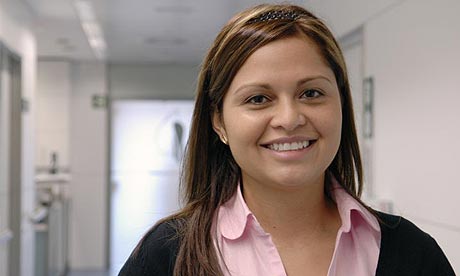Transplant first a giant leap for surgery
• Patient's stem cells used to engineer new organ
• UK scientists involved in pioneering technique
- guardian.co.uk, Wednesday November 19 2008 00.01 GMT
- The Guardian, Wednesday November 19 2008
-
 larger | smaller
larger | smaller - Article history

Claudia Castillo at the Hospital clinic of Barcelona after her trachea graft operation. Photograph: AFP/Getty images
Doctors have successfully carried out the world's first airway transplant on a young woman using an organ partly grown from her own stem cells in a groundbreaking operation which scientists believe will transform the future of surgery.
Surgeons replaced a section of Claudia Castillo's windpipe, that had been irreparably damaged by tuberculosis, with a donated organ that was stripped of its cells and used as a scaffold for her stem cells.
Because Castillo's body recognises her own cells in the replacement organ she does not need to take powerful drugs to suppress her immune system, unlike all other transplant patients. The technique raises the prospect of transplants for patients whose organs are damaged by cancer, who then cannot take the drugs as they increase the risk of cancer returning.
Professor Martin Birchall, from Bristol University, which carried out the stem cell engineering, said it would soon be possible to create a range of organs for transplants which patients' bodies will not reject. "In 20 years, this will be the most common form of surgery," he said.
A paper published in the Lancet medical journal online today, describes a cutting-edge collaboration involving doctors in three countries: Spain, the UK and Italy. In the paper, the authors write: "We think this represents a milestone and hope it will unlock the door for a safe and recipient-tailored transplantation of the airway in adults and children. We hope that these future patients will no longer suffer the trauma of speech loss, severe shortness of breath and limited social activities."
Castillo, 30, was referred to the Hospital Clinic, University of Barcelona, because TB had damaged her airways. The upper part of her windpipe was surgically repaired, but it was not possible to undo damage to the tube connecting the main windpipe to the left lung. Doctors rarely recommend a windpipe transplant because condemning a patient to a lifetime of immunosuppressant drugs - which makes them vulnerable to infections - is only thought worthwhile if it is the only way to save their life.
The standard option for somebody like Castillo would have been removal of the left lung, which would have restored her health but probably shortened her life.
Based on work done on animals, Professor Paolo Macchiarini offered her a procedure untried on humans. "We proposed tissue engineering to this lady," he said.
A piece of windpipe was taken from a donor and treated to remove all cellular material that Castillo's body might reject. Stem cells were removed from her hip and cultivated by researchers from Bristol University until they were ready to develop into cartilage, which would grow around the outside of the trachea.
More cells were taken from the mucous membrane around the tube linking her main windpipe to her right lung. These cells were treated by another Bristol team to be seeded on the inside of the new section of windpipe. Then scientists at Milan university constructed a bioreactor to foster the growth of the mucous membrane cells and the cartilage.
The operation took place on June 12. Macchiarini said: "As I was operating, I asked myself am I doing the right thing. I was very much afraid."
If things had gone wrong, Castillo knew her lung would have to be removed. But five months on, she is well and there is no sign of rejection of the transplant.
A tailor-made effort involving top scientists in three countries is an expensive exercise, but the scientists are confident that costs will come down and that the technique will help thousands of people in years to come. Professor Anthony Hollander, from Bristol, said: "The trick is to develop ways of scaling up," he said.
But the Barcelona hospital, said Macchiarini, had already made savings by no longer having to admit Castillo to intensive care twice a week at a cost of £3,000 a day, as it has done for the last three years.
Birchall said about 270 UK patients could benefit from a tissue-engineered windpipe transplant operation. But he believes it will eventually be possible to use the technique for all kinds of transplants.
guardian.co.uk © Guardian News and Media Limited 2008

No comments:
Post a Comment